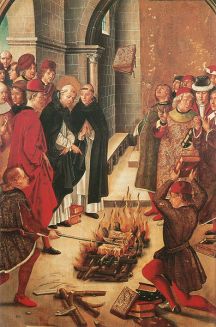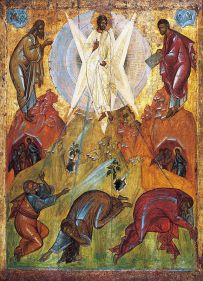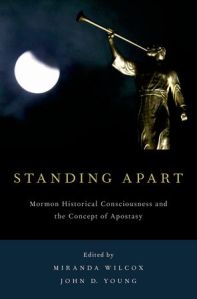I attend a Novus Ordo Mass (that is, the Mass in the vernacular) almost daily on campus at Notre Dame. I do love it when Latin is used in the liturgy, either in chant or in the parts of the Mass which remain the same weekly. Pat Archbold recently wrote an article titled, “7 Things to Restore the Sense of Sacred Your Pastor Could Do Tomorrow.” His suggestions are returning to an ad orientem Mass (thus having the priest and congregation face liturgical East together instead of the priest facing the congregation), using Gregorian chant and polyphony (recommended by Vatican II in Sacrosanctum Concilium), etc.
Another one of his suggestions was to use Latin for the parts of the Mass which remain the same week-to-week. I think this is a good idea and so I wanted to help do my part for anyone interested in implementing this. Thus, I’m going to start a series of posts where I give the Latin and English of the Novus Ordo line-by-line, then provide grammatical explanations for anyone interested. The grammar of the Mass in Latin is simple. Ecclesial Latin is not Cicero. I’m not going to provide pronunciation help, but you can easily find this online. The best way to get down the pronunciation is just to do it, however.
I also want to mention that I am allergic to liturgical politics, so this is not my way of siding with “traddies” or with “new-agers.” I just love the Mass, I love Latin, and I think both the TLM and the Novus Ordo can be celebrated reverently. If a parish were interested in using Latin and my explanations helped them, all the better.
As it’s always wise to begin with the beginning, let’s look at the Introductory Rites of the Mass in Latin. The parts the priest says are regular, the response of the congregation is in bold.
In nomine Patris et Filii In the name of the Father and the Son
et Spiritus Sancti and the Holy Spirit.
Amen. Amen.
First up: you already know at least one Latin word here and it’s the only word the congregation has to respond with, so you’re set.
For anyone with a bit of Latin under their belt:
nomine is an ablative neut singular noun from nomen and means “name.” In is a preposition and with the ablative means…well…”in” (among other things, but we’re only worried about it here).
Patris – genitive masculine singular from pater. The genitive case is often used for possession, so it makes sense here that we use it. We’re beginning the Mass “in the name of“. If the word for “Father” is in the genitive case, can you guess what Son (Filii) and Holy Spirit (Spiritus Sancti) are in? That’s right, genitive. The endings don’t look the same because they’re all different declensions (i.e. groupings of nouns in Latin). Pater is third, Filius is second, and Spiritus is fourth. The different declensions utilize different endings. You don’t need to know that to hear and understand these words in the Mass, however.
Then is said:
Dominus vobiscum. The Lord be with you.
Et cum spiritu tuo. And with your spirit.
Dominus is a nominative masculine singular noun meaning “Lord” or “the Lord.” Nominative nouns are the subjects of sentences. Dominus is related to English words like “Dominion” and “Domicile” (think of someone being Lord of their home).
Vobiscum should really be thought of as two words, vobis + cum. Cum is a preposition that means “with.” It is often affixed to the word with which it is translated into English so that it looks like one word. You can see the same word in your response “Et cum…” (and with). So what of vobis? It means “ya’ll” (I’m privileging my North Carolinian upbringing – when I teach Latin at Notre Dame, I make the students translate second plurals as “ya’ll” since English doesn’t really have one). So Vobiscum means “with you (all).”
Et is just the word “and.” It’s not the only word in Latin that means “and”, but it’s frequently used.
Spiritu is the same word we saw in the opening, except in a different case (there Spiritus). Here it is ablative masculine singular. It means “spirit.”
Tuo is a possessive adjective that goes with “spirit.” It simply means “your.” Easy, right? If you know any Romance languages, you probably already recognized this as “your” (think of Spanish “Tu” or the Italian “Tuo/Tua”).
One more part:
Kyrie eleison. Lord, have mercy.
Kyrie eleison. Lord, have mercy.
Christe eleison. Christ, have mercy.
Christe eleison. Christ, have mercy.
Kyrie eleison. Lord, have mercy.
Kyrie eleison. Lord, have mercy.
Oremus. Let us pray.
If you have ever recited the Kyrie and thought, “This is some funny sounding Latin”, you were onto something, because this is Latinized Greek. If you attend the TLM, you’ll know that each of these is said three times, but only once here in the NO. In the Greek, the phrase is Κύριε ἐλέησον.
If you have Greek, you’ll recognize Κύριε as the vocative (the case you use in direct address) of κύριος – the Greek word for Lord. Remember the Latin for this? Dominus. So you’re directly addressing the Lord here. Likewise, Χριστέ (Christe) is the vocative of χριστός (Christos).
ἐλέησον is the 2 singular aorist imperative of the verb ἐλεέω or its later form, ἐλεάω. Either way, you’re imploring God to be merciful.
The only actual Latin is what the priest says afterwards – oremus. This means “Let us pray.” It is a 1 plural (so “We” or “Us”) subjunctive (a hortatory subjunctive, if you’re into these things) from oro, orare. You may recognize the infinitival form of the verb (orare) from the famous Benedictine motto ora et labora (Pray and Work). The subjunctive is used here because the priest is exhorting us to pray.
That seems like enough for one post. I’ll continue to write more and try to get most of the Latin used in the Novus Ordo explained.



